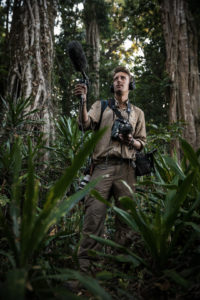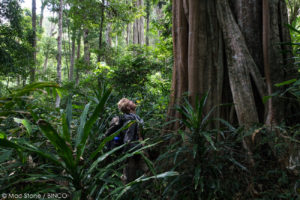Author – Dr Kate Baker – Research Fellow, Centre for Water Systems
Intrepid Explorers is a network and platform for university field researchers, enabling them to share experiences and learning, build skills, knowledge and connections across the field research community and with the general public.
In Exeter, this is centred on a monthly short talk at the Exeter Phoenix. The talks show that field research and science are inspiring for the widest possible audience.
The series in Exeter launched at the end of January with a talk about Blue Planet II. Professor Steve Simpson shared his experience as a Series Academic Advisor for the acclaimed series and other David Attenborough documentaries.
Much of Steve’s work focuses on underwater acoustics, including the use of sound by fish and invertebrates, and impacts of human noise on marine life. The ocean is a remarkably noisy place, with whales, dolphins, fish, and invertebrates all producing sound to communicate. These sounds range from the haunting song of the humpback whale song to the explosive clicks of snapping shrimp, and are important for social interactions and predator avoidance. In the talk, Steve explained how he has pioneered new ways of listening to the ocean and of interacting with fish to understand whole soundscapes and to unlock the language of fish. If you missed the talk, you can catch up with the online podcast.
Exeter Intrepid Explorers’ talks are free and organised by Intrepid Explorers, in association with the University of Exeter’s Global Systems Institute. Other upcoming topics include Mozambique’s forgotten rainforests, the acidification of the arctic, and a year spent by an anthropologist in a Namibian village.
John Puckey, one of the organisers explained the aim;
“Intrepid Explorers’ events show that field research and science are inspiring for the widest possible audience. The events are free entry, and have an informal atmosphere to encourage discussion and maximise participation for all of Exeter’s communities”
Dr Kate Baker, Research Fellow at the University of Exeter explained the partnership;
“The University’s new Global Systems Institute will advance our understanding of global changes. This will be achieved through transformative research and education. An important part of the process is sharing the stories of life in a global context with members of the wider community. This is why GSI is teaming up with Intrepid Explorers. This is an exciting event that inspires people to support, engage and advance research on global change through sharing and learning.”
Next Event: Mozambique’s forgotten ‘sky-islands’| Sam Jones

Details: Until recent years, the mountains of northern Mozambique- isolated mountain ‘archipelagos’ that lie adjacent to the main highlands of eastern Africa remained relatively unknown in terms of biology. Owing to their remoteness and civil war, there has been virtually no scientific study, so its forests are little known. In November 2017, Sam Jones’ team set about to understand its biological value. They discovered the presence of large numbers of highly range-restricted species and several new species to science. Sam will recount the tale of the expedition, its findings, and the unique value of the country’s mountains, also highlighting how much there is still to learn in this vast and fascinating region.

Date: 22 February 6.16-7.15 *Free tickets, book through Exeter Phoenix (Booking essential)*
Location: Exeter Phoenix
Facebook: https://www.facebook.com/events/439454216477578/
Twitter: @I_Explorers
#ExeterMarine is a interdisciplinary group of marine related researchers with capabilities across the scientific, medical, engineering, humanities and social science fields. If you are interested in working with our researchers or students, contact Michael Hanley or visit our website!
